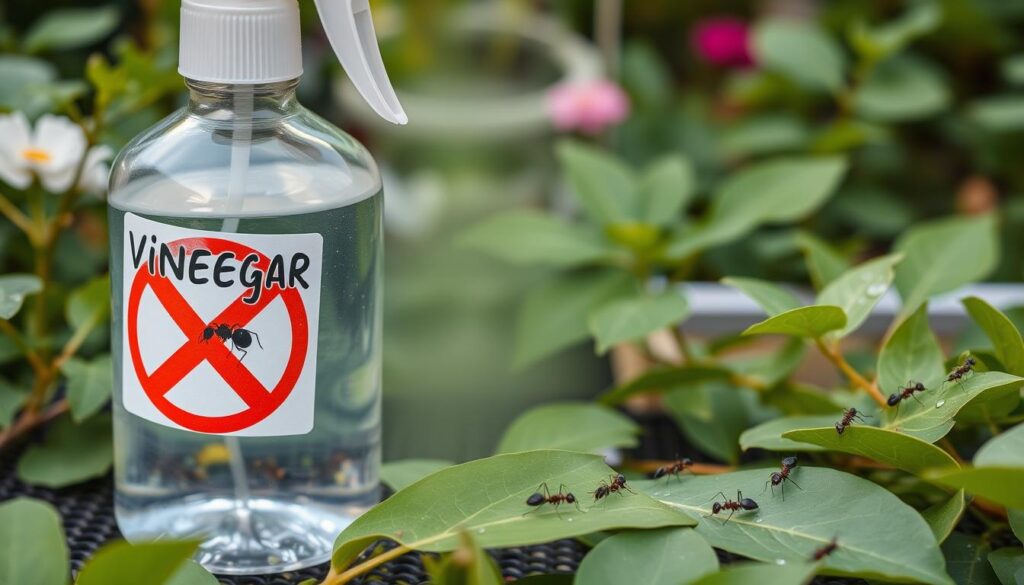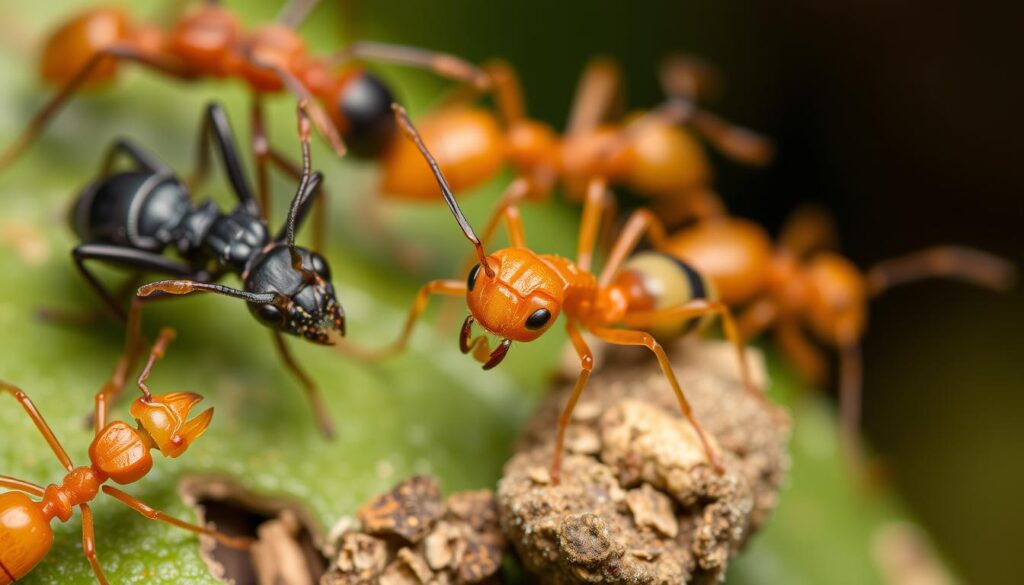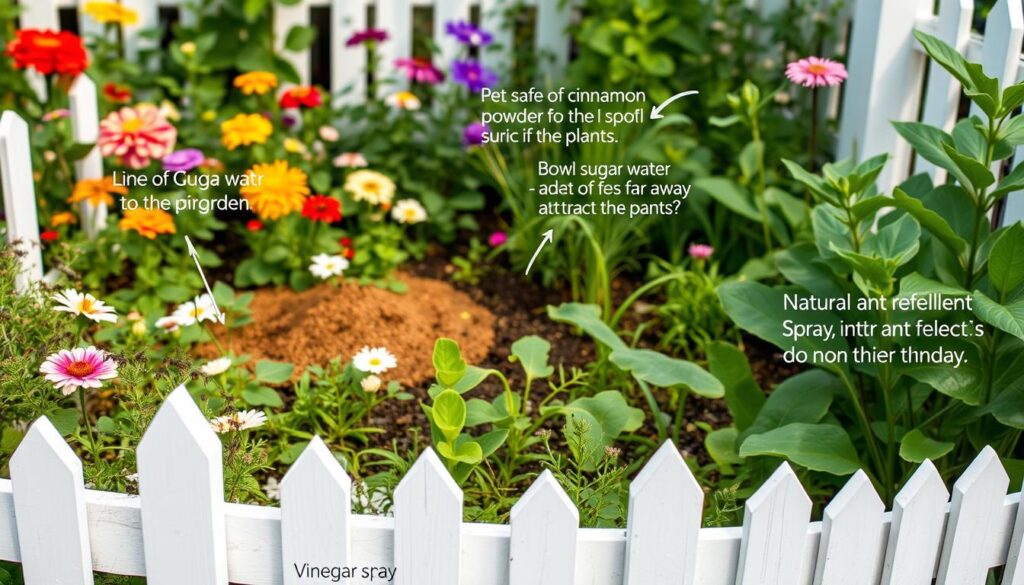Did you know a single ant colony can have up to 50,000 workers? This fact shows how big the ant problem can be for homeowners in their gardens. While ants help control pests and pollinate plants, they can still be a big nuisance. Luckily, there are safe ways to get rid of ants in your garden without hurting your pets.
This guide will cover natural and safe ways to control ants. We’ll look at using diatomaceous earth, borax, vinegar, and lemon juice. I’ll also share tips on identifying and managing different ant types in your yard. Plus, I’ll give advice on how to prevent future infestations safely for your pets.
Key Takeaways
- Diatomaceous Earth is a highly effective, pet-safe method for controlling ants in gardens.
- Borax is a slow-acting ant bait that can be used safely around pets when properly applied.
- Vinegar and lemon juice can deter ants without harming your furry friends.
- Identifying the specific ant species in your yard is crucial for implementing the right control methods.
- Baiting is generally safer than spraying for indoor ant control around pets.
Understanding Ant Behavior and Colonies
Ants are fascinating social insects that live in complex, structured colonies. To effectively eliminate ants from your garden, it’s crucial to understand their behavior and colony dynamics. Ants are efficient explorers and work together as a unit, making them challenging to control by simply repelling individual workers.
Why Repelling Individual Ants Doesn’t Work
Trying to repel or remove individual ants is often futile, as the colony will quickly replace them. Ants have a highly organized division of labor, with the queen, reproductive ants, and worker ants all playing essential roles. Targeting just the worker ants that you see foraging won’t address the root cause of the infestation – the entire colony, including the queen and nest.
The Importance of Targeting the Entire Colony
To effectively eliminate ants from your garden, it’s crucial to target the entire colony, including the queen and nest. Ants are a social insect that live in large, complex colonies, and the queen is responsible for producing new ants. Removing or disrupting the queen is the key to permanently eliminating the colony.
Understanding the structure and behavior of ant colonies is essential for developing a comprehensive, pet-safe approach to ant control in your garden. By focusing on the entire colony, rather than just individual ants, you can achieve long-lasting results and keep your outdoor spaces ant-free.
Using Diatomaceous Earth (DE) to Get Rid of Ants
Diatomaceous Earth (DE) comes from the fossilized remains of tiny aquatic organisms called diatoms. Its sharp, tiny particles cut through ants’ exoskeletons, causing them to dry out and die. Since insects lack a protective skin barrier, DE is very effective against them. It’s a safe and natural way to control ants in your garden.
What is Diatomaceous Earth?
DE is mostly made of silica, with 80% to 90% of it. It also has small amounts of minerals like calcium, magnesium, and iron. Since the 1960s, DE has been used as a pesticide, killing many insects including ants and bedbugs.
How Diatomaceous Earth Works Against Ants
DE can control many types of ants, like pavement and fire ants. How long it takes to kill ants depends on the colony size and how bad the infestation is.
DE damages ants’ exoskeletons, causing them to lose moisture and die. The abrasive particles in DE cut through the ant’s outer shell, leading to dehydration and death.
Safety Considerations for Using DE Around Pets
Food-grade Diatomaceous Earth is safe for humans and pets when used correctly. But, it’s important not to breathe in the dust as it can irritate your lungs.
When using diatomaceous earth as an ant killer in gardens with pets, pick a food-grade type and follow the instructions. Mix four tablespoons of DE with one gallon of water for outdoor use. You might need to reapply after rain or heavy watering.
DE can help control fire ants but might not wipe out entire colonies because of their large numbers and many queens. For carpenter ants, DE might not work well, and you might need professional help for big infestations.
Borax: An Effective Slow-Acting Ant Bait
Many homeowners use borax to safely kill ants. Borax is a natural mineral that is toxic to ants. It works by being slow-acting. This means ants can carry it back to their nest, killing the queen and others.
What is Borax and How Does it Work?
Borax is a mineral found in some dry places, like California and the Southwest. When ants eat borax, it harms their stomachs, causing a slow death. This slow effect lets the poison spread through the colony.
Some ants like borax baits more than others. The type of bait matters for how well it works. A good mix is 1 part borax to 3 parts sugar.
Creating a Borax Bait Solution
- Combine 1 part borax with 3 parts sugar in a small container.
- Add enough water to create a thick, syrupy consistency.
- Place the bait solution near areas of high ant activity, such as trails or nests.
- Monitor the bait and replenish it as needed, as the ants will continue to consume it and carry it back to the colony.
Borax is usually safe for pets but can be harmful if eaten. Keep it away from kids and pets. Also, be careful when using it outside, as it can harm garden insects.
Using borax can help get rid of ants without harsh chemicals. It keeps families and pets safe.
Vinegar: A Natural Ant Trail Disruptor
Many homeowners use vinegar to get rid of ants without harming pets. Vinegar doesn’t kill ants, but it can stop them from coming into your home or garden. It does this by breaking their scent trails.
Does Vinegar Really Kill Ants?
Vinegar doesn’t kill ants. But, its strong smell can cover the trails ants use to find food. This makes it hard for ants to find their way and stops them from coming inside.
Using Vinegar as a Homemade Ant Spray
To make a DIY vinegar ant spray, mix equal parts vinegar and water in a spray bottle. Spray it on ant trails, where ants enter, and where you see them. The smell of vinegar will confuse the ants and stop them from returning.
For the best results, spray the vinegar solution often. It’s a safe way to keep ants away without using harmful chemicals. It’s perfect if you have pets at home.

“Using vinegar to get rid of ants is a simple, cost-effective, and environmentally-friendly solution. While it may not eliminate the entire colony, it can be a valuable tool in your arsenal against these persistent pests.”
Lemon Juice: A Pleasant Alternative to Vinegar
Looking for a natural, pet-safe way to keep ants out of your garden? Try lemon juice. It smells better than vinegar and can mask the scent trails ants use to communicate and find food. This makes it a good choice for those who dislike the smell of vinegar.
To make a lemon juice ant spray, mix one part lemon juice with three parts water in a spray bottle. This safe solution can be sprayed on ant trails, entry points, and where ants are active. The lemon juice’s acidity disrupts the ants’ scent trails, keeping them away from your garden.
You can also use lemon peels to keep ants away. The d-limonene in lemon peels repels some types of ants. Place lemon peels around your garden or in areas with ants to create a barrier they won’t cross.
“I just used the lemon juice ant spray and it works GREAT!!! The ants DO NOT like it at all!” – NF
Lemon juice and peels can help keep ants away, but they might not get rid of an entire colony. For tough infestations, you might need to try other safe methods like diatomaceous earth or borax baits. But for a gentle, nice-smelling way to keep ants away, lemon juice is a good choice.
how to get rid of ants in the garden without harming pets
Keeping ants out of your garden while keeping pets safe is tough. Luckily, there are safe ways to get rid of ants without harming your pets.
Diatomaceous earth (DE) is a great, pet-safe choice. It’s a natural mineral powder that cuts through ants’ exoskeletons, drying them out and killing them. It won’t hurt your pets or plants. Just sprinkle it where ants are a problem and add more as needed.
A boric acid and sugar solution is also effective. The sugar draws ants in, but the boric acid stops them from digesting. Just remember to keep this away from pets and kids.
- Vinegar can break up ant trails by masking their pheromones.
- Lemon juice and citrus peels will keep ants away with their strong smell.
- Using cinnamon, cayenne pepper, or chalk can stop ants from crossing over.
To keep ants out of your garden safely, focus on natural methods that target the whole colony. Using these methods together can get rid of ants without hurting your pets.
| Pet-Safe Ant Control Method | How it Works | Safety Considerations |
|---|---|---|
| Diatomaceous Earth (DE) | Slices through ants’ exoskeletons, causing dehydration and death | Safe for pets and plants when used as directed |
| Boric Acid and Sugar Bait | Disrupts ants’ digestive systems, leading to their demise | Keep mixture away from pets and children |
| Vinegar | Disrupts ant trails by masking pheromones | Harmless to pets and plants |
| Lemon Juice and Citrus Peels | Repels ants with strong, unpleasant scent | Non-toxic and safe for pets |
| Cinnamon, Cayenne Pepper, or Chalk | Creates a physical barrier that ants won’t cross | Completely safe for pets and plants |
By using a mix of these natural, pet-friendly methods, you can keep ants out of your garden safely.
Identifying and Treating Ant Species in Your Yard
Knowing which ants are in your garden is key to a safe, effective control plan. Different ants need different treatments. Let’s look at how to spot common garden ants and treat them safely, without hurting pets.
Dealing with Odorous House Ants and Carpenter Ants
Odorous house ants and carpenter ants are common in gardens. Odorous house ants smell like rotten coconut when crushed. They’re not a big threat to plants. Carpenter ants, however, can damage wood and harm your garden.
To fight these ants, a mix of cornmeal, borax, and honey works well. It’s safe for pets and effective. This mix is a great, pet-safe.
Managing Pavement Ants Safely
Pavement ants are small and dark, living in garden cracks. They’re not a big threat to plants but can be annoying. To keep them away safely, try lemon juice or baking soda with powdered sugar.
Controlling ants in your yard means knowing which ones you have and treating them right. By understanding each ant type, you can use safe methods. This keeps your plants and pets safe.

Pet-Safe Indoor Ant Control Strategies
Dealing with ants at home can be tough for pet owners. Chemical sprays and powders can harm our pets. Luckily, there are pet-safe ant control methods that work well without risking your pets’ health.
The Benefits of Baiting Over Spraying
Baiting over spraying for indoor ants is safer for pets. Ant bait stations have low chemical levels that kill ants but are safe for pets. These baits attract ants, which take the bait back to their colonies, wiping out the whole colony.
Applying Ant Baits Safely Around Pets
When using ant baits around pets, follow the instructions closely. Put the bait stations where pets can’t get to them, like behind appliances or along baseboards. This keeps your pets safe from the bait. Also, check and replace the bait stations often to keep your pet-safe ant control working well.
Knowing how baiting works and using it safely can help get rid of ants indoors. It also keeps your pets safe. A bit of care and the right method can keep your home free of pests and safe for your pets.
Preventing Future Ant Infestations
To keep ants out of your garden for good, focus on prevention. Use pet-safe treatments and proactive landscaping. Also, keep up with regular monitoring and baiting. This will help lower the chance of future ant problems that could harm your pets.
Landscaping Tips to Deter Ants
Make your garden less inviting to ants with simple landscaping changes. Here are some tips:
- Maintain proper plant spacing to eliminate moist, sheltered areas that ants find attractive
- Clear away dead leaves, twigs, and other organic debris that can provide nesting sites
- Trim back overgrown vegetation to expose potential nesting spots
- Use mulch or gravel around plants to create a barrier that ants find difficult to cross
Regular Inspections and Baiting
Along with landscaping, keep an eye on your garden for ants. Look for signs like mounds, trails, or worker ants. If you see ants, use pet-safe baits or traps to stop them in their tracks.
By using strategic landscaping and regular monitoring and baiting, you can keep ants away. This ensures a safe and fun outdoor space for you and your pets.
Choosing the Best Ant Killer for Pets
When dealing with ants near pets, making sure the products are safe is key. Essential oils might seem like a good, pet-friendly choice. But, they often don’t work well against ants for a long time. Professional ant baits can be a better choice if used safely around pets.
Essential Oils: Safe but Ineffective?
Essential oils like peppermint, cinnamon, and lemon might keep ants away for a bit. But, they don’t get rid of the whole colony. Some essential oils can also be harmful to pets if they eat them. So, be careful when using them near pets.
Professional-Grade Baits and Their Proper Application
For a lasting solution, think about using professional ant baits, like Advion Ant Gel. These baits mix food with a slow insecticide. Ants take this back to their colony, killing it off. If you apply them right, they’re safe for pets as long as pets can’t get to them.
To safely use ant baits with pets, follow these steps:
- Put the bait stations where pets can’t get to them, like behind appliances or in cabinets.
- Don’t put the bait on surfaces pets hang out on or can reach.
- Check the bait stations often and refill them when needed to keep them working well.
- Tell your family why it’s important to keep pets away from the bait stations.
Knowing the limits of essential oils and how to use ant baits safely lets you get rid of ants. This way, you keep your pets safe and healthy.
Conclusion
There are many ways to safely remove ants from your garden without harming your pets. Using things like diatomaceous earth, borax baits, vinegar, and lemon juice is key. These methods target the whole ant colony, not just the workers.
Knowing which type of ant you have and using professional-grade baits can also keep your pets safe. By following these tips, you can make your garden safe and free from pests. This way, you and your pets can enjoy a healthy outdoor space.
Being proactive is important in keeping your garden ant-free. Regular checks and taking steps to prevent ants can make a big difference. With the right methods and some effort, you can ensure your garden is safe and welcoming for everyone.
FAQ
How can I get different pets in Pakka Pets?
You can get new pets in Pakka Pets by doing tasks, quests, and challenges. As you progress, you’ll unlock various pet breeds and species. This lets you grow your virtual pet collection.
How do I adopt virtual pets in Pakka Pets?
To adopt pets in Pakka Pets, you need to earn in-game currency or resources. Use this to buy or “adopt” pets from the shop or adoption center. The pets you can get depend on your progress and unlocking levels or features.
What kind of virtual pet collection can I build in Pakka Pets?
In Pakka Pets, you can build a big virtual pet collection. You’ll find many pet breeds and species to discover and add to your collection. The game has everything from common pets to rare and exotic animals for you to care for and customize.
How does the gameplay of Pakka Pets work?
Pakka Pets is a game where you take care of virtual pets. You feed, play, groom, and keep your pets happy. You’ll do tasks, join events, and unlock new features to grow your pet collection and experience.
What tips and guides can help me in Pakka Pets?
There are tips and guides to help you in Pakka Pets. They cover managing your pet’s needs, using resources wisely, unlocking new pets, and joining events for rare pets.
How can I find and unlock rare pet breeds in Pakka Pets?
To get rare pets, complete specific challenges, quests, or events. Sometimes, you need to save up currency or resources for special pets. Look for limited-time offers or exclusive adoption centers.



